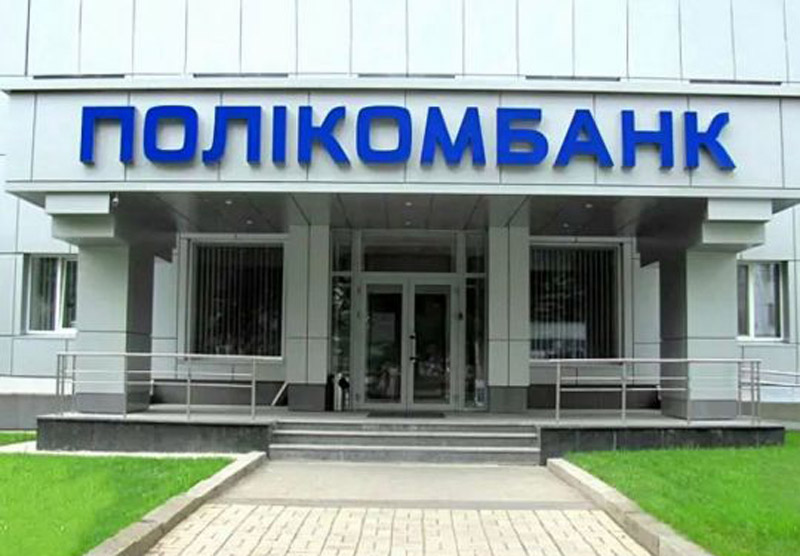Черниговский карманный «Поликомбанком» семьи Тарасовцев может быть ликвидирован


В течение 2014−2016 годов Национальный банк Украины как регулятор признал неплатежеспособными 90 украинских банков.
Первой причиной такого решения стал экономический кризис, вызванный российской агрессией. Вторая заключалась в том, что большинство ликвидированных банков были «карманными», то есть были созданы для обслуживания основных бизнесов (небанковских) их владельцев и местных властей.
Несмотря на реформирование банковской системы в тот период, подобные мелкие банки еще остаются, однако из-за множества нарушений законодательства их ждет судьба 90 предшественников. Одним из первых «на выход» готовится черниговский «Поликомбанк», принадлежащий семье местных застройщиков Тарасовцов. Рассказываем, что не так с банком и почему его клиентам стоит об этом знать.
Показательным примером «карманного» банка является харьковский «Мегабанк». Он принадлежал Виктору Суботину, директору государственного предприятия «Турбоатом». Пользуясь своим положением руководителя одного из крупнейших производств в Харькове и всей Украине, «Мегабанк» постепенно аккумулировал счета «Турбоатома», хотя конфликт интересов был очевидным.
Кроме того, «Мегабанк» обслуживал львиную долю счетов Харьковской городской администрации, а с годами расширил свою сеть на обслуживание почти всех коммунальных платежей полуторамиллионного города. Харьковчане еще могут помнить, что отделения этого банка были разбросаны по всему городу, как теперь отделения «Новой почты». Жители города могли платить счета даже в маленьком окошечке на станциях метро.
Все это выглядело как удобство для местных властей и людей, однако никто из них не подозревал, что банк постепенно приближался к пределу платежеспособности.
Схема использования подобных банков достаточно проста: владельцы банка договариваются с местными властями и поощряют людей вкладывать государственные и частные деньги, которые затем выдаются в виде кредитов компаниям, связанным с владельцами этого банка. Далее, если все идет нормально, деньги возвращаются, а в случае наступления любого кризиса деньги исчезают в карманах владельцев банка. НБУ пытается не разрешать банкам кредитовать связанные компании и лиц, собственно, из-за именно таких рисков, поэтому и прекратил существование многих подобных банков. Однако схема никуда не исчезла и действует по сей день, преимущественно в небольших региональных банках.
Вторая очередь на ликвидацию
По данным источников в НБУ, сейчас регулятор внимательно изучает ситуацию в черниговском «Поликомбанке». Причин тому несколько.
Первая причина — использование той же схемы кредитования связанных компаний и лиц.
По данным Нацбанка, «Поликомбанком» владеют 39 человек, а крупнейшими акционерами являются Александр Тарасовец (45%), Юрий Тарасовец (23%) и Николай Тарасовец (4%) — два сына и отец, соответственно.
Активы банка по состоянию на 1 января этого года составляли 784 млн грн, обязательства — 492 млн грн, капитал банка — 292 млн грн, финансовый результат за 2023 год — 1,1 млн после налогообложения. Судя по этим данным, банк выглядит относительно стабильно, однако финансовый результат — менее 27 тысяч долларов в год по нынешнему курсу — не способен прокормить 39 акционеров. Проще говоря, такие деньги не делают их владельцев богачами, тем более что в прошлые годы банк вообще не давал никакой прибыли. Тогда зачем семье Тарасовец банк? Для обслуживания других своих бизнесов, то есть банк изначально создан именно для этого, а затем начал привлекать деньги людей и делает это сейчас.
В 2020 году глава семьи и «Поликомбанка» Николай Тарасовец баллотировался в Черниговский облсовет, поэтому в местной печати выходили его интервью (судя по всему, заказные, потому что очень комплиментарные). В одном из них господин Тарасовец буквально признался в том, что банк создан именно для обслуживания интересов связанных компаний: «Вместе с местными предприятиями — „Домобудівником“, Черниговской макаронной фабрикой, Корюковской фабрикой технических бумаг, фирмой „Сіверянка“ и другими — мы решили, что необходимо создавать черниговский банк, который сможет оперативно реагировать на запросы производителей региона, учитывая особенности их бизнеса и ситуацию на рынке. Так, в 1994 году на базе Черниговского филиала „АвтоВАЗбанка“ был создан „Поликомбанк“, а вышеупомянутые предприятия стали акционерами и внесли свой вклад в уставный фонд».
То есть банк был создан местными предприятиями, что в 1990-х годах считалось нормой. Однако сейчас это считается угрозой любому банку, и, кстати, Валерий Коломойский именно по этой причине (одной из многих) потерял свой «ПриватБанк», поскольку его финансовое учреждение кредитовало другие бизнесы Коломойского. По иронии судьбы Тарасовец-старший шел на выборы от партии «За майбутнє», которую ассоциируют с Коломойским.
Тарасовец-старший признался, что теперь среди клиентов банка есть местные компании, но внимание привлекает одна из них — черниговский застройщик «ОСНОВА-БУД-7».
«Для нас главным приоритетом является финансовая поддержка местных предприятий, ведь это рабочие места и благополучие для жителей области. В основном все средства, привлекаемые банком от населения, мы направляем на развитие Черниговщины», — сказал он и тем самым подтвердил, что деньги вкладчиков банка идут на финансирование других бизнесов Тарасовцов.
Также внимание следует уделить не только «ОСНОВА-БУД-7», но и компаниям ООО «Черниговгорстрой» и ЖК «Комфорт»: всеми ими руководят сыновья — Александр и Юрий.
С учетом того, что оба сына занимаются строительным бизнесом в Чернигове, довольно странным выглядит тот факт, что отец был главой комиссии по вопросам управления и распоряжения объектами коммунальной собственности Черниговского облсовета, а Юрий был главой земельной комиссии Черниговского горсовета. Если это не конфликт интересов, тогда что же это?
О таком конфликте уже давно сообщал черниговский активист Александр Гашпар: «Если некоторые депутаты Черниговского городского совета, его секретарь и черниговский городской голова думают, что никто не замечает, как они принимают решения в условиях конфликта интересов: кто о выделении своей организации бюджетных средств на проведение определенных мер, кто о выделении родному братику земельного участка или же о разработке детального плана за бюджетные средства для частной структуры того же братика, и т. д., то они ошибаются и ошибаются работники юридического отдела городского совета, которые считают, что конфликт интересов у городского головы, например, есть только тогда, когда речь идет о его близких лицах, забывая о том, что частный интерес, согласно положениям антикоррупционного законодательства, может быть обусловлен не только личными и семейными, но и дружескими или другими внеслужебными отношениями с физическими или юридическими лицами, в том числе те, которые возникают в связи с членством или деятельностью в общественных, политических, религиозных или других организациях».
Вероятно, «Поликомбанк» за счет простых вкладчиков финансирует строительства, которые ведут его же акционеры. И выглядит так, что именно строительный бизнес, а не банк, кормит семью Тарасовец, банк — только инструмент, который в случае чего легко покинуть. Однако сейчас рынок недвижимости переживает свои худшие времена, особенно из-за войны, близости Чернигова к границе со страной-агрессором и постоянных обстрелов города. Поэтому «ОСНОВА-БУД-7» оказалась в тяжелом положении, и существует высокая вероятность того, что проблемы застройщика станут проблемами «Поликомбанка» и, как следствие, его вкладчиков.
Более того, «ОСНОВА-БУД-7» является едва ли не единственным более-менее весомым клиентом семейного банка, и оба принадлежат семье Тарасовец.
Типичный застройщик
На самом деле проблемы преследуют «ОСНОВА-БУД-7» постоянно. При том, что отцу и его сыновьям удается получать привлекательные земельные участки и привлекательные условия, им не всегда удается достроить и продать недвижимость без скандалов.
«ОСНОВА-СТРОЙ-7» вело или ведет строительство на семи участках. При этом здание по адресу ул. Мазепы, 23, должен быть введен в эксплуатацию в 2021 году, однако при том, что он уже продан, строительство было заморожено.
За дом в районе Масаны Тарасовцы уже получили деньги покупателей, однако братья требовали доплаты якобы из-за подорожания строительных материалов, а фактически они нарушили условия контрактов с покупателями.
Вторая семья
Интересна и структура собственности «ОСНОВА-БУД-7». Согласно декларации Юрия Тарасовца, поданной им в 2023 году, он является владельцем и получил 1,5 млн гривен прибыли от деятельности этой компании. А двумя другими совладельцами являются Хоменко Татьяна Владимировна и Хоменко Владимир Иванович: дочь и отец. Госпожа Татьяна является владелицей 4-го по размеру пакета акций «Поликомбанка», господин Владимир — 12-го, а еще Дмитрий Хоменко — сын Владимира и брат Татьяны, и ему принадлежит 6-й по размеру пакет «Поликомбанка». (Здесь следует добавить, что все без исключения 39 акционеров «Поликомбанка» — из Чернигова или Черниговской области и родственные связи среди владельцев достаточно широкие.)
В сущности, банком и строительным бизнесом распоряжаются две семьи. И именно это обстоятельство — связь собственников банка с другими бизнесами — и вызывает беспокойство НБУ, ведь в случае проблем с основным бизнесом проблемы неизбежно перекинутся и на банк, который имеет обязательства перед тысячами других вкладчиков.
Однако это не единственное, что беспокоит государственных регуляторов.
Прачечная
В апреле прошлого года на сайте НБУ появилась новость, значение которой смогли оценить только сами банкиры: «Национальный банк применил к трем банкам и одиннадцати небанковским финансовым учреждениям меры влияния за нарушения в сфере финмониторинга и валютного законодательства». Среди нарушителей был и «Поликомбанк». Что именно он нарушил?
Не раскрывая всех деталей, Нацбанк письменно предупредил «Поликомбанк» о нарушении требований абзаца первой части первой статьи 8 Закона «О предотвращении и противодействии легализации (отмыванию) доходов, полученных преступным путем, финансированию терроризма и финансированию распространения оружия массового уничтожения» в части ненадлежащего исполнения банками обязанности разрабатывать, внедрять и обновлять внутренние документы по предотвращению и противодействию отмыванию денег.
То есть в НБУ уже знают о том, что «Поликомбанк», возможно, отмывает деньги или закрывает на это глаза, и высока вероятность того, что рано или поздно будут введены санкции против банка Тарасовцов: от обысков до ареста счетов.
За «Поликомбанком» следили и независимые наблюдатели. Но Национальное рейтинговое агентство «Рюрик» приостановило долгосрочный кредитный рейтинг «Поликомбанка», а также рейтинг надежности депозитов. Это произошло в 2016 году, именно тогда, когда НБУ вывел с рынка те же 90 банков. Но рейтинговое агентство решило не включать в рейтинги «Поликомбанк» и в 2022 году: до сих пор депозиты и кредиты черниговского банка не считаются надежными. Причина того, что «Поликомбанк» был выброшен из рейтинга надежности (всего таких банков было 2 из 12), достаточно банальна: банк Тарасовцов перестал предоставлять агентству данные о своей деятельности. Долгое время «Поликомбанк» признавался надежным, но последние годы начал скрывать информацию о себе, и для этого, очевидно, были причины. Даже на своем собственном сайте данные об оценке собственной устойчивости «Поликомбанк» в последний раз обновлял в 2021 году.
Кто пострадает?
Сейчас НБУ приказал «Поликомбанку» провести докапитализацию до конца года, поскольку его залоговые активы не имеют подтвержденной стоимости, то есть неизвестно, сколько они стоят и стоят ли чего-то вообще.
Второе требование — провести реструктуризацию инсайдерского кредитного портфеля, то есть банк должен получить от заемщиков реальные залоги, а поскольку таким заемщиком является «ОСНОВА-БУД-7», то, скорее всего, ни первое, ни второе условия выполнены не будут.
Все это дает Нацбанку достаточно оснований для того, чтобы вывести банк с рынка, ликвидировав его (национализация маловероятна, поскольку «Поликомбанк» не является системным и не имеет более-менее существенной ценности — именно из-за сомнительного пула заемщиков).
При этом ликвидация банка не отразится на банковской системе, поскольку «Поликомбанк» действительно невелик и по размеру капитала и обязательств, и по размеру собственной сети — только 17 отделений, которые находятся преимущественно в Чернигове и области. Однако следует отметить, что через «Поликомбанк» выплачиваются пенсии и зарплаты «бюджетникам», которые будут вынуждены пережить довольно неприятные моменты, пока обязательство не возьмет на себя другой банк.
Между тем, Юрий Тарсовец во время войны находится в США, хотя является гражданином Украины и ему 49 лет (призывной возраст), а его брат, 48-летний Александр, живет в Германии, иногда наведываясь на родину.
Recent Posts
Сбежавший в Швейцарию блогер Станислав Домбровский просит прощения у украинцев
Одесский трэш блогер Стас Домбровский, который в последнее время проживает в Швейцарии, записал видеообращение к…
Александра Устинова и атака на руководство АОЗ: что стоит за волной критики
Александра Устинова, народная депутат, которая в последние дни активно атакует Агентство оборонных закупок (АОЗ) возможно…
Журналисты показали имение киевской судьи, закрывшей дело Приходько
Свобода "под ключ" или манипуляция правосудием? Борис Приходько – нацбанкир времен Януковича и действующий нардеп…
Судьи вне закона
В течение последних трех лет внимание общественности если и бывает приковано к судам, то гораздо…
Артем Ляшанов и bill_line спасают репутацию через суд
Финтех-компания столкнулась с обвинениями в отмывании денег игорной мафии. ООО «Тех-Софт Атлас» (ТМ «bill_line») и…
Криптобиржа WhiteBIT: как Владимир Носов и «регионалы» Шенцевы отмывают деньги и помогают спецслужбам России
Владимир Носов в Украине пытается позиционировать себя как респектабельный бизнесмен и хозяин криптобиржи WhiteBIT. Однако…

